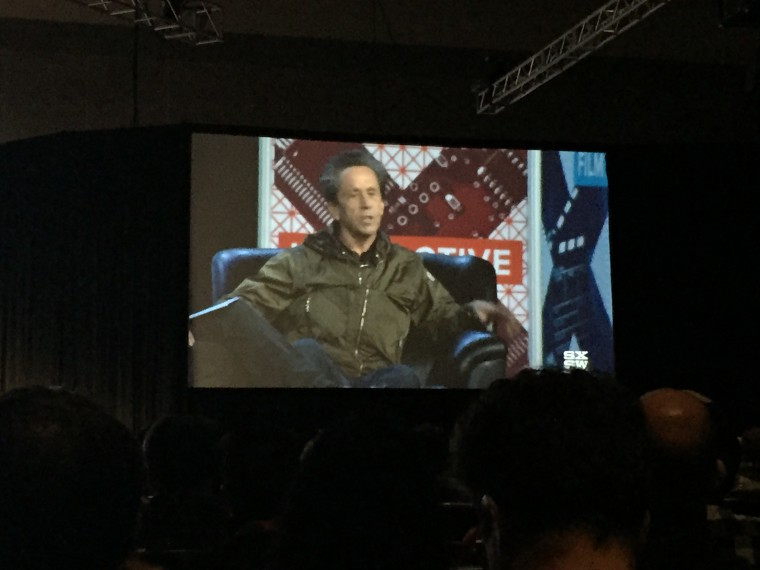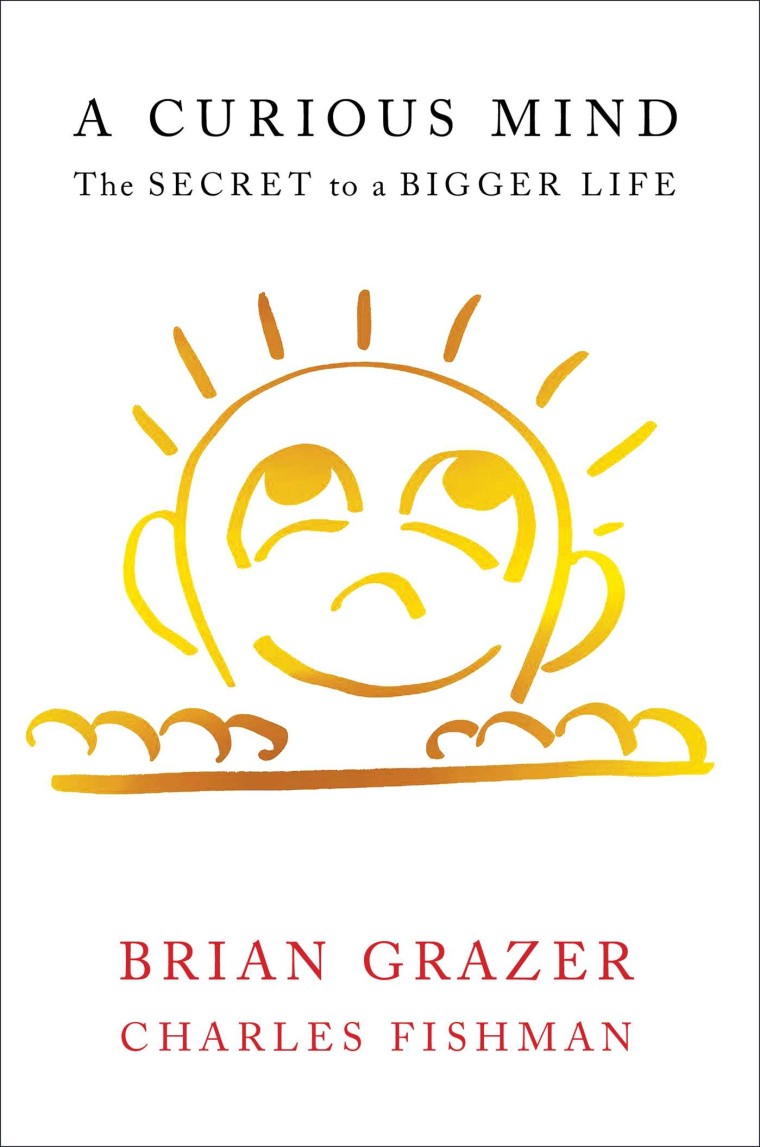“I make movies and TV shows, but I am curious about everything.”
That is how Imagine Entertainment co-founder Brian Grazer describes himself on Twitter.
Brian Grazer is the Academy Award–winning producer of A Beautiful Mind, Apollo 13, Splash, Arrested Development, 24, 8 Mile, J. Edgar, and many more. His films and TV shows have been nominated for forty-three Academy Awards and 131 Emmys. In 2007, he was named one of Time’s 100 Most Influential People in the World.
In yesterday’s Q&A with Charles Fishman, Grazer revealed how his curiosity led him to meetings with notable figures, and how those conversations often sparked insights and ideas that ultimately led to classic films.
I thoroughly enjoyed their conversation and walked away from it inspired and motivated to be more curious. It was humbling to witness such a notable figure in the entertainment world be so down-to-earth, human, and encouraging, and much of what he conveyed is universally applicable.
The Value of Curiosity Conversations
“Curiosity is the source of all my success.”
The crux of Brian’s creativity stems from what he refers to as “curiosity conversations.” He meets with people who are experts in something other than show business – subjects like politics, science, medicine, religion, and anything else.
Brian encouraged the audience to have similar conversations with experts and to get outside their comfort zone. In planning these conversations, you always want to bring a benefit of some kind and parlay trust.
He proceeded to connect the dots surrounding the number of ways doing so has influenced his career and life.

Brian grew up in a small neighborhood and didn’t encounter much outside it until he went to college. After college, he didn’t feel like he’d learned anything. Inspired by his abnormal psychology professor with whom he realized he hadn’t really met, Brian stalked him until he agreed to meet for a few minutes over coffee.
They ended up talking for an hour and a half. “It was so intellectually and emotionally rewarding,” Brian noted, relaying that he learned more in that single conversation then he had during the entire duration of the professor’s class.
This is where he got the idea to start meeting with people. It was never about seeking a movie and there’s never a specific agenda. These meetings are strictly about seeking ideas.
“Curiosity is the solution to every problem that you’ve got.”
Where Ideas Are Created
Brian met with seven of the best trial lawyers in the country to understand the process and find common ground. These individuals use words to convince people of an argument that sometimes is valid while other times, flawed. Nevertheless, the force of their words can convince people profoundly.
This sprouted the idea, “Can anyone, for one day, be forced to tell the truth for a day?”
Thus, the notion for the film Liar Liar was born.
“The grey area between the question and the answer is where ideas are created.”
When Grazer first received the script for 24, he wasn’t sure about it. Along the way, he met with people in the CIA that he thought were interesting, and they provided insight into pushing Brian to remain involved with the project. While he never met a Jack Bauer, he did indeed meet people in the real world who do something similar to what he does.
“The conversations are the artistic fertilizer of what comes up on the screen. It enriches everything that lives in your mind in terms of exploring possibilities.”
The Dynamic Duo
Brian shared in detail about his partnership with Ron Howard and how it came about. Ron had a “glow” about him that was magnetizing. Allow that this aspect of the conversation was conveyed through a personal story, but the takeaways were significant and applicable to any business partnerships (as well as personal relationships).
“At the end of the road that we travel differently, we end up in the same place on our sense of taste and quality.”
He attributes the longevity and success of their partnership to their similar taste, work ethic, and the level of trust they’ve been able to build. These three qualities are critical in any relationship.
“I knew the difference between right and wrong but didn’t always know he right answer. He could be my conscience.”
They also have rules on how to deal with each other, which involve mutual respect – they never yell at each other and everything is always talked out. They have a sensitivity to reach other creatively and emotionally. Everything is leadership through a question. For example, rather than giving an order like, “You should call X,” Brian would say, “Do you think it’s time to call X?”
“Our neurology is so different, but the things that matter, we access equally.”
Connecting the Dots
Twenty-five years ago, Brian met a woman named Veronica Denegra who had tragically been tortured in Chile for a year and a half.
In speaking with her, Brian not only learned about torture, but also about survival. He was able to relate the conversation to something he was interested in – survival and how people survive in scary situations.
Veronica survived by creating an alternative reality, so her senses were being constantly redirected to a story.
Years later, inspired by his son’s Asperger syndrome, Brian wondered how he could help Riley and de-stigmatize disability on a larger scale?
Thus, the film A Beautiful Mind came to be. The book A Beautiful Mind focused on John Nash, a Nobel-prize winner who has schizophrenia. While it conveys John’s story, the book doesn’t actually enter the mind; it didn’t showcase what it looks like to be inside the mind of someone with schizophrenia. It was subjective.
So, Brian wondered, what would it look like to be objective? He recalled Veronica and thought about the having of another reality, and that aligned with what it seemed having schizophrenia would be like. He applied this to John in the movie, and it worked.
“You can never know how the dots will connect; how opportunities will come alive when you never knew they existed.”
Veronica also influenced Apollo 13. Brian knew nothing about space, but he did know about survival. With a great compassion for survival, Brian sought to examine how astronauts would reach inside themselves for emotional and intellectual resources to save themselves.
 Brian conveyed movies that are successful are about identifying value and self-worth – people with something that they’re driven to do that has some nobility. The primary obstacle is typically themselves.
Brian conveyed movies that are successful are about identifying value and self-worth – people with something that they’re driven to do that has some nobility. The primary obstacle is typically themselves.
After the conversation, I ran to the bookstore to acquire Brian and Charles’ book, A Curious Mind. Amazon states:
A Curious Mind is a brilliantly entertaining, fascinating, and inspiring homage to the power of inquisitiveness and the ways in which it deepens and improves us. Whether you’re looking to improve your management style at work or you want to become a better romantic partner, this book—and its lessons on the power of curiosity—can change your life.
I can’t wait to read it!
Photos taken by author. Book cover from Amazon.





![AI Overviews: We Reverse-Engineered Them So You Don't Have To [+ What You Need To Do Next]](https://www.searchenginejournal.com/wp-content/uploads/2025/04/sidebar1x-455.png)